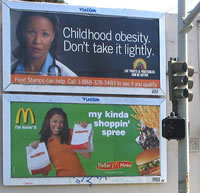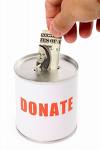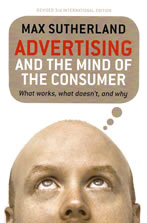![]() Receive new posting via RSS feed. >Click the icon on the left to subscribe.
Receive new posting via RSS feed. >Click the icon on the left to subscribe.
(Or right click the icon to copy and paste the link into your rss reader)
Temptation Turn-off Tactics:
Lead Me Not Into Temptation
 By Max Sutherland
By Max Sutherland
Don’t shop when you’re preoccupied…or when you’re hungry. Do good deeds after, but not before, shopping. And shop well in advance. Research reveals psychological tips to help control impulses and resist temptation.
Trying to pit intellect against impulse is usually futile. We know that salad is better for us than choosing a Big Mac but while our mind says salad, our taste buds and stomach collude to scream out “gimme a Big Mac”. That’s why rational ad messages such as ‘eat wisely or ‘drink in moderation’ so often come across as lame. We just can’t seem to help ourselves in spite of knowing the negative consequences if we allow impulse to hold too much sway.
Yet, there is no disputing that impulse control is increasingly important both personally and for solving world problems as diverse as obesity, smoking, compulsive shopping and even global warming. But if appealing to our intellect rarely works, what does? How can we exert more influence and control over our impulses? The answer is to take advantage of how the mind works. Rather than engage the mind in combat, we want it to work for us. For example, if we eat before going to the supermarket, we can influence our state of mind, which in turn can make us less vulnerable to temptation while food shopping.1 In other words we can use a temptation turn-off tactic that can help us control impulses.

Personal Turn-off Tactics
Such tactics enable us to influence and take advantage of states of mind to make better decisions. They don’t have to be extreme actions like cutting up our credit cards. They can also be less dramatic like being sure to eat before going food shopping. A recent review paper by Milkman et al explores this focus of research within a related field called ‘want/should conflict’. That means conflict between what we ‘want’ and what our more rational side says we ‘should’ choose.2 The paper makes fascinating reading and has considerable implications for new turn-off tactics that can assist us to resist temptation.
Time Shift
A general implication that emerged in the paper is this. Resistance to temptation is generally improved by making decisions well in advance. This resonates with me in relation to one of my food vices… raisin bread. If it is in our kitchen, I will eat far too much of it. At the supermarket however, I find it easier to resist and therefore I can refrain from buying it. Knowing that it can’t tempt me if it is not in the house, I therefore use a ‘pre-commitment device’ and time-shift my decision. The further in advance of consumption we are actually buying the less power temptation seems to have over us. Indirect evidence for this was found in a study of online grocery shopping orders by Milkman et al 2008.3 The further in advance of delivery that online shoppers place their order, the less ‘vice’ products in their orders that they actually buy.
Package Sizes
While I control my raisin bread ‘vice’ by refraining from buying, others take a slightly different tack. They buy in tiny quantities. A study by Wertenbroch 4 found that consumers are prepared to pay more to buy smaller packages of various ‘vice’ foods in order to avoid having too much of them around. 5
Non-Intuitive Tactics
Milkman’s paper identified a number of mind states that can help us curb temptation and make us more likely to choose what we should rather than what our impulses dictate. Here are two really curious ones:
- Avoid shopping immediately after you have done something constructive like a good deed.

Khan and Dharfound that subjects are more likely to report they would spend a tax rebate on a pair of expensive, designer sunglasses (the want choice) than on a pair of less-expensive, utilitarian sunglasses (the should choice) if they have just imagined donating $100 from their tax rebate to charity.6 Engaging in a ‘should’ behavior seems to give psychological permission to indulge the self.
Similarly the same researchers found that subjects in a hypothetical forced-choice task were significantly more likely to choose to buy a pair of designer jeans (the want choice) than a vacuum cleaner (the should choice) after imagining spending 3 hours per week volunteering for community service (a should behavior). The implication here is ‘share the love …but shop first’
- Shop when your mind is free and not when you are mentally preoccupied. We seem to have less resistance to ‘vice’ products when we are under cognitive load. Shiv and Fedorhikin 7 had subjects hold in memory either a seven-digit number (the high cognitive load condition) or a two-digit number (the low cognitive load condition). Then, when given a choice between a slice of chocolate cake (a want snack) and a cup of fruit salad (a should snack), significantly more subjects (63%) selected cake over fruit salad in the high cognitive load condition than in the low cognitive load condition (42%). It seems that resistance takes effort and we have a limited capacity for effort. So don’t shop when the mind is already loaded.
Conclusion
We can expect to see much more research in this area of ‘want/should’ conflict because curbing impulses is more than just of personal concern. Although the research in this area seems trivial, it bears indirectly on many of the more important problems facing the world today, not the least of which is climate change and global warming. If left uncontrolled, impulsive decisions that many of us make every day scale up into huge social problems like under-saving for retirement, compulsive shopping, energy shortages, and diseases related to obesity, smoking and alcohol. Applying this research to making turn-off tactics work in the service of social policy is the next major challenge.
“I can resist everything except temptation.” Oscar Wilde
Download a PDF copy of "Temptation Turn-off Tactics: Lead Me Not Into Temptation"
For more on turn-off tactics... click here.
Notes1. Sutherland, A. M. & T. Davies (1979). Influences on the total of the tape and time spent in supermarkets. Marketing at CIT Publications: Retailing & Marketing Series No 1, January. .
2.Milkman, K. L., T. Rogers, et al. (2008). Harnessing Our Inner Angels and Demons: What We Have Learned About Want/Should Conflicts and How That Knowledge Can Help Us Reduce Short-Sighted
3. Milkman, K.L., Rogers, T., & Bazerman, M.H. (2008b). I'll have the ice cream soon and the vegetables later: A study of online grocery purchases and order lead time (HBS Working Paper 07-078). Unpublished manuscript.
4. Wertenbroch, K. (1998). Consumption self-control by rationing purchase quantities of virtue and vice. Marketing Science, 17, 317–337.
5. But see Scott, Maura L. et al (2008). The Effects of Reduced Food Size and Package Size on the Consumption Behavior of Restrained and Unrestrained Eaters. Journal of Consumer Research, 35, No. 3,
6. Khan,U.,& Dhar, R.(2006). The licensing effect in consumer choice. Journal of Marketing Research, 43.
7. Shiv, B., & Fedorikhin, A. (1999). Heart and mind in conflict: The interplay of affect and cognition in consumer decision making. Journal of Consumer Research, 26, 278–292.


